#the road to wigan pier
Text
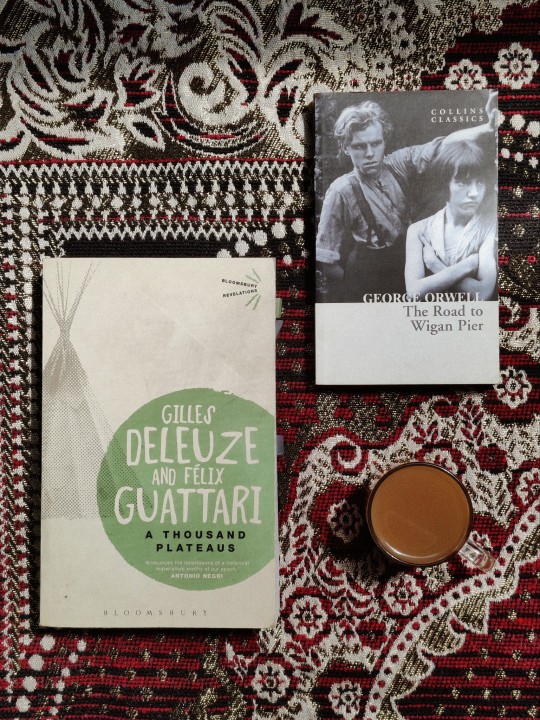
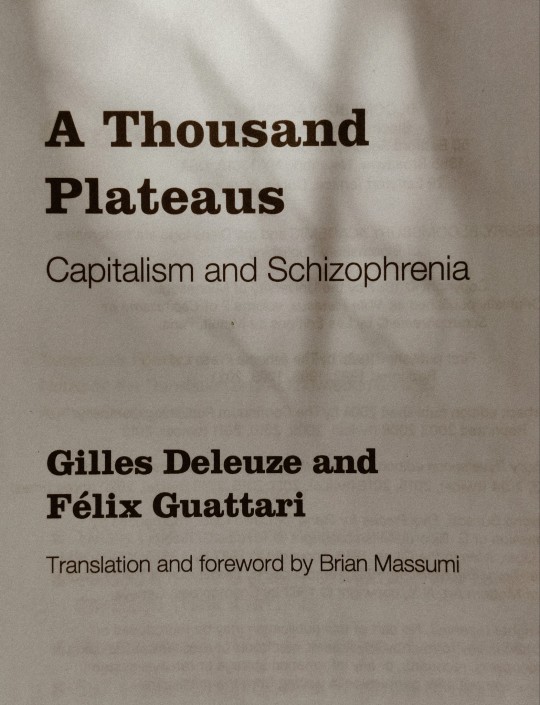
on wednesdays we (try to) read deleuze.
#gilles deleuze#félix guattari#psychoanalysis#george orwell#a thousand plateaus#the road to wigan pier#political philosophy#french literature#studyblr#booklr#dark academia#light academia#dark academia aesthetic#light academia aesthetic#mine#studyblog#bookblog
6 notes
·
View notes
Photo
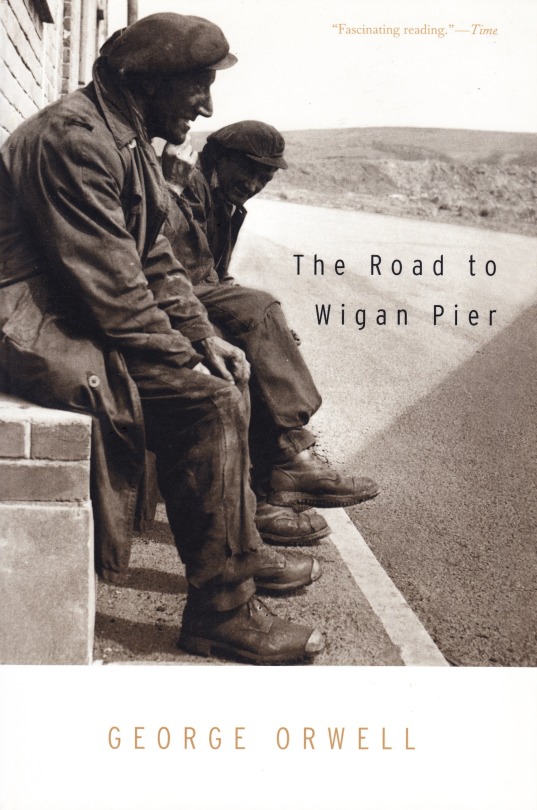
The Road to Wigan Pier (1937)
George Orwell
Harcourt Inc.
2 notes
·
View notes
Text
Messiness Obliterated
Mr. Messy
By Roger Hargreaves
Egmont World, 1972
In The Road to Wigan Pier, George Orwell’s account of his time spent among coal mining communities in northern England, he recounts how when he was brought up he was taught that the lower classes smell. He writes:
Race-hatred, religious hatred, differences of education, of temperament, of intellect, even differences of moral code, can be got…

View On WordPress
#Book Review#Children#Children&039;s Literature#Cleaning#George Orwell#Literature#Mr. Messy#Picture Books#Reality TV#Review#Roger Hargreaves#The Road to Wigan Pier
0 notes
Text

"As I write this the Spanish Fascist forces are bombarding Madrid, and it is quite likely that before the book is printed we shall have another Fascist country to add to the list..."
George Orwell near the end of "The Road to Wigan Pier" writing in late 1936:
1 note
·
View note
Text
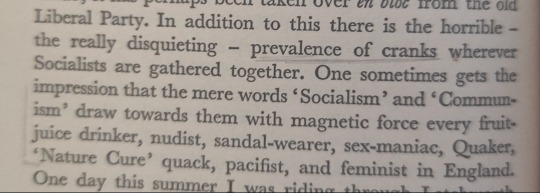
An interesting lineup of what were considered hacks and esoterics in Orwell's England in 1937.
0 notes
Text
We could do with a little less talk of ‘capitalist’ and ‘proletarian’ and a little more about the robbers and the robbed.
Road to Wigan Pier by George Orwell
5 notes
·
View notes
Text
During the rise of Nazism in Europe Orwell said was the only way to permanently defeat fascism  but socialists where the biggest hindrance on socialism
And he was correct and still is because most of you are more interested in being labelled a socialist than actually doing the work to build a proper socialist movement
Because most of you don’t wanna acknowledge the fact that for socialism we would all have to change and make sacrifices to improve the lives for everyone
6 notes
·
View notes
Text
“Ok so the other bookshelf hasn’t arrived yet but why don’t I start organising my books, it will be a fun activity and useful!”
What nobody tells you about said fun activity is that you have to make Choices about how to organise and it’s all very confusing
#I run into this problem EVERY DAMN TIME and I still hate it#I like my history books arranged a certain way so that tends to fuck up the Dewey Decimal or any other system I attempt to impose#Ok so for example what to do with primary historical sources like chronicles and collections of letters#Do I put them with the mediaeval literature section (some of which also functions as a primary historical source- i.e. the Brus)#Or do I put them with my history books (ordered by time period and country)#Or do I put them in their own tiny little category of their own- an extremely confusing and apparently irrational category#Or biographies of authors of which I only have two or three#Do I put them with my other history books or next to the literary works they wrote or on their own little section again#But since I only own maybe three it would be a weird little section just Aphra Behn James Herriot and Robert Henryson by themselves#And then what on earth do I do with C.S. Lewis' Allegory of Love#It's technically literary criticism but I don't own many books in that vein#Never mind the question of whether I should separate novels poetry and plays even if it breaks up an author's output#I don't really want to have to look for Violet Jacob or Oscar Wilde in two or three different places#And then sometimes a book doesn't fall into either of those three categories- should split Nan Shepherd's novels from the Living Mountain?#And what if it's a 'Collected Works' by an author which contains a bunch of non-fiction historical essays as well as a novel?#And don't even get me started on what I'm supposed to do with the Road to Wigan Pier#And then THEN we come to Wodehouse#Do I put Leave it to Psmith with the other Psmith books or in the midst of the Blandings books?#I want all the Psmith series together but what if some hypothetical person new to Wodehouse wandered in#And wanted to start either series at random- would they be confused at the introduction of Blandings too early?#Wouldn't they miss out on some of the best bits that come with knowing Blandings BEFORE Psmith?#I don't know who this hypothetical person is by the way#Nobody's wandering into my house and browsing my bookshelves except me so I don't know who I'm curating this for#I suppose in the back of my mind I always thought I would have kids who would one day be pulling randomly at the family bookshelves#And so that's why I've saved some of the fiction books but I'm not likely to have or even want children so what is the point#I'm not even the kind of person who regularly rereads my childhood favourites but somehow I can't bring myself to throw the kids' books out#It's an immense waste of space and a bit pretentious to have lots of books that nobody else will ever read#Honestly I'd have been happier running a public library or a bookshop I think or even having a flatmate to share books with#Ah well if this is a problem at least it's quite a nice one to have; first world problems only this evening I'll count my blessings#Earth & Stone
8 notes
·
View notes
Photo
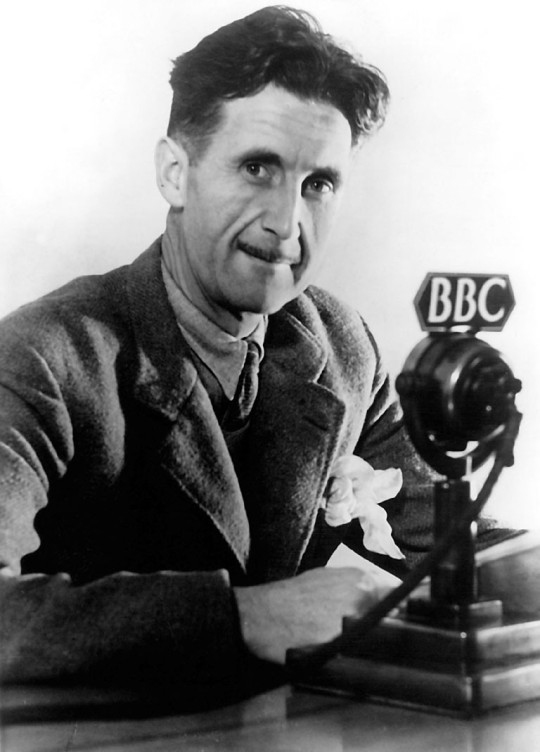
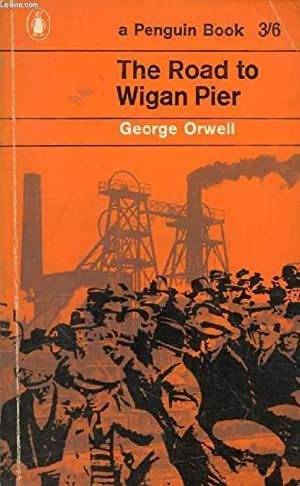
The logical end of mechanical progress is to reduce the human being to something resembling a brain in a bottle. That is the goal towards which we are already moving, though, of course, we have no intention of getting there; just as a man who drinks a bottle of whiskey a day does not actually intend to get cirrhosis of the liver.
—George Orwell, The Road to Wigan Pier, ch xii (1937)
[Scott Horton]
9 notes
·
View notes
Text
“The truth is that no modern man, in his heart of hearts, believes that it is right to invade a foreign country and hold the population down by force. Foreign oppression is a much more obvious, understandable evil than economic oppression. Thus in England we tamely admit to being robbed in order to keep half a million worthless idlers in luxury, but we would fight to the last man sooner than be ruled by Chinamen; similarly, people who live on unearned dividends without a single qualm of conscience, see clearly enough that it is wrong to go and lord it in a foreign country where you are not wanted.
“The result is that every Anglo-Indian is haunted by a sense of guilt which he usually conceals as best he can, because there is no freedom of speech, and merely to be overheard making a seditious remark may damage his career. All over India there are Englishmen who secretly loathe the system of which they are part; and just occasionally, when they are quite certain of being in the right company, their hidden bitterness overflows.
“I remember a night I spent on the train with a man in the Educational Service, a stranger to myself whose name I never discovered. It was too hot to sleep and we spent the night in talking. Half an hour’s cautious questioning decided each of us that the other was ’safe’; and then for hours, while the train jolted slowly through the pitch-black night, sitting up in our bunks with bottles of beer handy, we damned the British Empire– damned it from the inside, intelligently and intimately. It did us both good. But we had been speaking forbidden things, and in the haggard morning light when the train crawled into Mandalay, we parted as guiltily as any adulterous couple.”
~George Orwell, The road to Wigan pier
Orwell himself was at the time he describing an officer of the imperial police, which made an especially acute mark on his conscience. I think about this passage often; it provides for one thing a better lens of analysis for some of his better known works than easily half the eisegesis usually supplied for him on either side of the aisle. But there’s really quite a lot to say about it besides
262 notes
·
View notes
Text


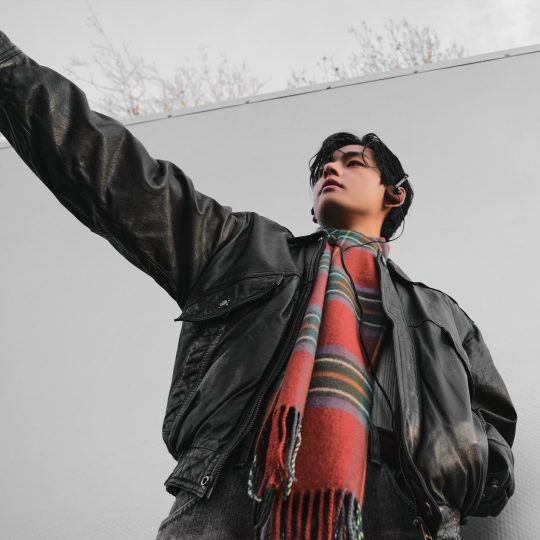



You're in my head
I had plans for the weekend
But wound up with you instead
Back here again
Got me deep in my feelings
When i should be in your bed
You and i go back to like '09 it's like forever
And you were there my lonely nights, yeah, keeping me together
So wouldn't it make sense if I was yours and you could call me your baby
But we say we're just, say we're just
Friends
Just for now
Yeah but friends don't say words that
Make friends feel like more than just
Friends
Just for now
Now I'm over pretending
So let's put the "end" in friends
Friends
Just for now
Yeah but friends don't say words that
Make friends feel like more than just
Friends are not supposed to get too close
And feel emotions that we're feeling now, now, now
We ain't slowing down, down, down
But once we cross the line, there's no denying you and I can never turn around, round, round
Know we'll never be the same
You and I go back to like '09 it's like forever
And you were there my lonely nights, yeah, keeping me together
So wouldn't it make sense if I was yours and you could call me your baby
But we say we're just, say we're just
Friends
Just for now
Yeah but friends don't say words that
Make friends feel like more than just
Friends
Just for now
Now I'm over pretending
So let's put the "end" in friends
V 'FRI(END)S' Release
🎧 Listen now: https://ingrv.es/friends
Credits:
Director: Samuel Bradley
Production Company: Iconoclast TV
EP: Maeva Tenneroni, Jean Mougin, Guy Rolfe
Head of Production: Kate Sharpe
Producer: Martha Mcguirk
Directors Agent: Yoni Yosef
Casting: Road Casting
Casting Director: Coralie Rose
Casting Assist: Luis Torrecilla, Laura Meredith
Love Interest: Ruby Sear
Production Manager: Chanel Parkinson
Production Co-ord: Alice Hayes
Artist Liason: Jo Thompson
Cast Co-ord: Beth Rubery
Production Assistant: Callum Anderson
Production Runner: Mia Tessema
Intimacy Coordinator: Stella Moss
Movement Director: Yagamoto
Location Manager: Ryan Colaco
Location Assistant: Eser Savrin, Lois Constantinou
1st AD: Ben Gill
2nd AD: Gabriel O’Donohoe
3rd AD: Kitty Rajakulasingham, Aloha Kulieshova
Runner: Kai Rajakulasingham, Joe Heap, Danny Zanre, Anna Kovalevska, Grace Goodworth, Kwesi Mcleod, Darren Sintes, Tyson Douglas, Tiger Brewers
DOP: Jake Gabbay
A CAM Focus Puller: Rozemarijn Stokkel
A CAM 2nd AC: Ania Bahadrian
Trainee: Guillem Zamora
B CAM Operator Day 1: Juanjo Salazar
B CAM Operator Day 2: Jomar O’Meally
B CAM 1st AC - Alex Rawson
B CAM Trainee: Ollie Wesley
Camera Car: Davide Viera
Key Grip: Darren Quinn
Crane Tech: Henry Stone
Grip Trainee: James Quinn
Gaffer: Kieran Brown
Electrician: Shuan Clark, Ed Irvine, John Joe Besagni, Akeel Fleary, Cieran Nash, Amarjeet Singh, Laurent Arnaud
Master Rigger: Lee Doran
Rigger: Joe Parrott, Jamie Brindle, Ryan Ross, Alfie Berry, Scott Allen, Joe Knight
Video Playback: Liam Coles
Playback Assistant: Elvis Mcgovern
DIT: Lilly Palmer
Production Designer: Staci Lee Hindley
Art Director: Nia Samuel
Prop Master: Ezra Piers Mantell
Prop Buyer: Jessa Thorpe, Shopie-Mai Wigans
Art Assistant: Harry Beedle, Camilla Byles, Tom Hope, George Mein, Freya Wentworth, Alice Moles
Home Economist: Olivia Somary
Action Vehicle Driver (Car): Dan Chester
Action Vehicle Driver (Bus): Tom Burnage
SFX; Sean Harland
SFX Technician: Danny Matters
Stunt Coordinator: Jim Dowdall
Stylist: Justin Hamilton
Stylist Assistant: Samela Gjozi, Colleen Finnerty, Lorna Lane, Chris Atkins, Vania Monteiro, Katherine Somavia, Anna Menshykova, Mel Lyse
Hair Stylist: Simon Izard
Hair Assistant: Julie West, Aaron Dorn, Natasha Rose, Natasha Lawes
Makeup Assistant: Sophie Gia Moore, Marta Wozniak
Makeup Trainee: Rebecca Robinson
Medic: Alex Gardner, Richard Drakesford
Paramedic: Lynsey Shewring
Mini Winnego Driver: Phil Rainer
Honeywagon Driver: John Suttion
Production Sprinter: Jos Benschop
Minibus Driver: Rob Higgs, Gavin Baker, Granger Goodey, Dean Cumbers
Label Vehicle: Blerim Morina, Othman Abashikh, Peter Tarling, Steven Smith
Artist Trailer: Paul Haddock
Artist Wardrobe: David Czekalski
Honeywagon Driver: Martin Dean
Wardrobe Truck: Warren Smart
Hmu Truck: Wally Smart
Dining Bus: Andy Byrne
Location Security: Randal Berbick, Billy Bridger, Alan Laney, Kerri Mccann, Malakai Mars, Angelo Evangelou, Richard Johnson, Mathew Richards
Edit House: Assembly Rooms
Editor: Jack Williams
Edit Producer: Phoebe Armstrong-Beaver
Edit Assist: Bruna Manfredi, Tamara Ishida
Post Production: Cheat
Grade: Toby Tomkins
Post Producer: Joanna Dawson, Jen Saunders
Post Sound House: Soundtree Music
Sound Designer: Jack Patterson
Sound Producer: Neil Athale
BIGHIT MUSIC. Rights are reserved selectively in the video. Unauthorized reproduction is a violation of applicable laws. Manufactured by BIGHIT MUSIC, Seoul, Korea.
Connect with BTS:
https://ibighit.com/bts
/ bts_bighit
/ bts_twt
/ bangtan.official
/ bangtantv
/ bts.bighitofficial
/ bts_official_bighit
https://weverse.onelink.me/qt3S/94808190
https://www.weibo.com/BTSbighit
http://btsblog.ibighit.com
#V_FRIENDS #FRI_END_S #뷔 #V
#bts v#bts taehyung#bts v friends#bts friends to lovers#bts rm#bts jihope#bts jimin#bts jungkook#bts jin#bts suga#bts army#bts v mv#bts new#kpop kings
9 notes
·
View notes
Text
I think fat acceptance is a big ask for people at the start of ED recovery
I am all for people being treated with dignity regardless of their body size. I think the fact that there is such a drive to not become a fat person or to shrink your body if you are a fat person is a reflection of a vain society that really doesn't care about health - and if it does, health is only held up as virtuous because it is a sign of hypothetical self-respect and discipline. That eating disorders or disordered eating in general exist proves that the need to appear to be in control and healthy is more important than the actual fact of the virtues thinness claims to represent.
I am not making a claim about the sociocultural route of eating disorders, but it is my experience that they are often triggered because of an initial attempt at self-improvement. The fact that the self-improvement is directed toward the body itself points to the game that the people whose eating disorders have a cultural component are playing - one in which whoever is thinner sits at the top of the hierarchy, has won by virtue of their sickly appearance alone, and one that is won by any means necessary.
I say all of this to acknowledge the problem of the disgust directed toward the fat person that is a component of eating disorders and many emerging cultural practices around food*.
However, a person trying to recover from an active eating disorder is often not in the position to immediately take an activist stance against the hatred for fatness when their entire motivational framework has often been structured around becoming thinner. In the coming days, I will attempt to outline how the fat acceptance movement being presented as the alternative to disordered eating and lifestyle dieting isolates people in recovery by presenting fat acceptance as the thing they must subscribe to in order to recover, how immediately attempting to eat intuitively is not a good way to recover from an eating disorder in its acute phases, and how a lack of information about how to bridge the gap between body positivity and an eating disorder harms people who don't have the means to access higher levels of care.
*this reminds me of Chapter 11 of George Orwell's The Road to Wigan Pier, not in that I believe that fatness can be equated with wealth but in that there is a hatred for fatness rather than a love of the virtue of thinness that drives disordered eating
#eating disorder recovery#ed recovery#ana recovery#pro recovery#mental health#body posititivity#body neutrality#fatphobia#diet culture
8 notes
·
View notes
Text
A working-class bachelor is a rarity, and so long as a man is married unemployment makes comparatively little alteration in his way of life. His home is impoverished but it is still a home, and it is noticeable everywhere that the anomalous position created by unemployment--the man being out of work while the woman's work continues as before--has not altered the relative status of the sexes. In a working-class home it is the man who is the master and not, as in a middle-class home, the woman or the baby. Practically never, for instance, in a working-class home, will you see the man doing a stroke of the housework. Unemployment has not changed this convention, which on the face of it seems a little unfair. The man is idle from morning to night but the woman is as busy as ever--more so, indeed, because she has to manage with less money. Yet so far as my experience goes the women do not protest. I believe that they, as well as the men, feel that a man would lose his manhood if, merely because he was out of work, he developed into a 'Mary Ann'.
George Orwell in "The Road to Wigan Pier" (1937)
A good example on how even unemployed working-class men in England in the 30s don't do housework, despite having the time to do so and that his unemployment burdens his wife with more work. The idea that only middle class men or higher feel entitled to their wives' free labor is silly.
Also, if we take it at face value, an example of these married women's investment in the myth of masculinity even to their own detriment.
#radical feminism#feminism#mypost#the part about women and babies being masters of the house in middle class households i disagree with but the rest is apt
9 notes
·
View notes
Photo
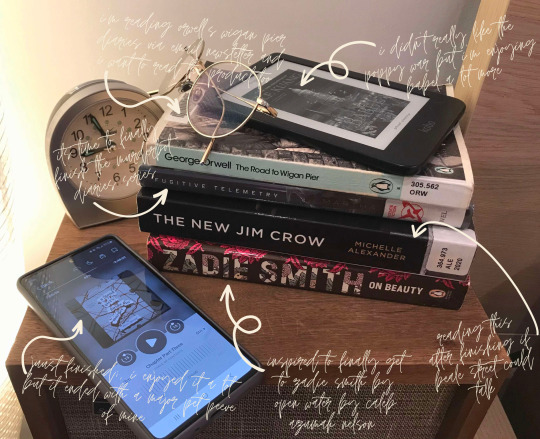
Emmers’ Annotated Nightstand
The magazine Literary Hub runs a column called The Annotated Nightstand, profiling what books notable authors and poets are reading now and next. I wanted to make my own, especially since I happened to have a lot of physical copies on the tbr right now.
Babel - R. F. Kuang
I read The Poppy War the year it came out and felt very ambivalent about it. I finished it, but it was tough and not good enough to want to read the sequel, especially since it hadn’t been published yet at the time. I wasn’t initially planning to read Babel either and remain smug and too cool for R. F. Kuang. But after some great recommendations from a couple friends I picked it up to preview for a translator friend who also didn’t like The Poppy War. I’m glad I did! Maybe it is that the historical fantasy setting lets Kuang be a lot more explicit in her social commentary (it is just as pointed as in Poppy War but it’s a lot easier to tell what it is pointed at), or maybe it is just that this book’s protagonist is less of an emotional hot mess, but Babel goes down a lot smoother. I’m now looking forwards to Kuang’s next release, Yellowface.
The Road to Wigan Pier - George Orwell
Unfortunately we live in interesting times and George Orwell is the bipartisan saint of political turmoil. With little enough context the images from his more allegorical works are used to defend just about any political opinion. Personally I think the writings that are the least fictionalized are the best entry point into Orwell’s work. I read Down and Out in Paris and London last year via email newsletter and this year the newsletter has moved on to The Wigan Pier Diaries, the diary Orwell kept on his research trip through the north of England. That’s where I’m from. Orwell actually stayed a week in the same neighbourhood in Leeds that I lived in back in 2021. I’m interested to see how Orwell fictionalized his journey in the novel, and, of course, in his general socialist writing. There is a lot of conflict in the diaries between socialist organizers driven by ideology and under- or un-employed socialist club members driver by subsidized beer.
Fugitive Telemetry - Martha Wells
I got this out of the library because I’d been putting off finishing the excellent Murderbot Diaries series by having books with more immediate claim to the top of my tbr.
The New Jim Crow - Michelle Alexander
Officially I started The New Jim Crow because I read If Beale Street Could Talk by James Baldwin and Between the World and Me by Ta-Nehisi Coates in February and this seemed like a good next step. Unofficially it is because ‘Alexander’ is right at the top of my goodreads books and it was bothering me that the first couple books were still unread. Either way I’m glad I got to this. It’s already super informative about the history of incarceration in America and just how quickly our perception of incarceration has changed. I’m starting to realize just how significant the judicial system is as a barrier to social progress and justice. Previously I saw it as a more subversive route to change, but after these books (as well as Empire of Pain by Patrick Radden Keefe) it is hard to ignore how the justice system allows powerful people to essentially simply ignore the law.
One Beauty - Zadie Smith
This is one of my mum’s favourite books. Zadie Smith is an author I’ve been meaning to read for over a year, but it’s also been low on my priority list without a library return deadline to motivate me. I’ve put it on the nightstand to keep it at the front of my mind. I’m reading it now because of how Smith was referenced in Open Water by Caleb Azumah Nelson. She is the protagonist’s favourite author (even though the book he talks about is NW, not On Beauty).
A Good Girl’s Guide to Murder - Holly Jackson
I just finished reading this today. I picked it up because one of my book channel friends said it was one of the best examples of ya mystery out there and I wanted to give the genre a second shot. I was really enjoying it for most of the run time; I like the way the protagonist has such minimal angst about pursuing the case and that she makes progress really quickly. In particular, every significant setback is immediately followed by a fresh lead. It’s a great technique. However, my opinion soured by the end of it. Towards the climax the protagonist starts lying when she really doesn’t need too, and there’s the ‘I need to hurt you to keep you safe!’ trope, which I hate. I have a lot of mixed feelings about this.
#books#book lover#reading#book blog#i'm back#its been a rough few weeks inspiration-wise but i'm trying to warm back up to it by#writing short things like this#to at least have some things finished
6 notes
·
View notes
Text
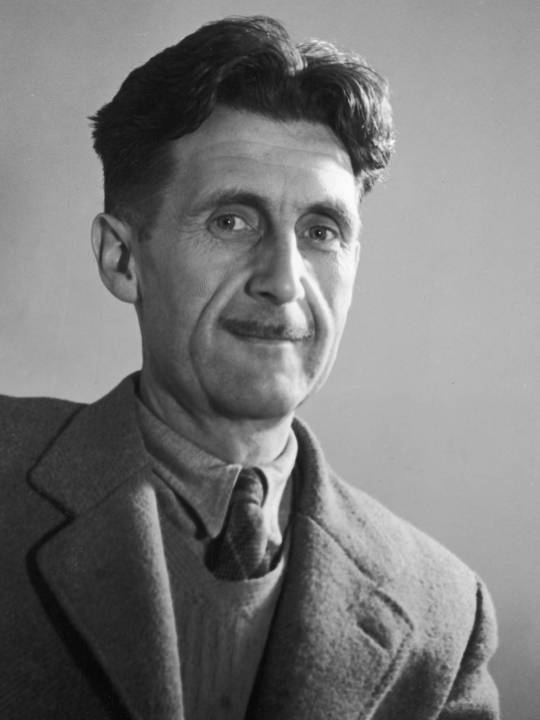
George Orwell published Down and Out in Pairs and London, Burmese Days, A Clergyman's Daughter, Keep the Aspidistra Flying, The Road to Wigan Pier, Homage to Catalonia and Coming Up for Air within consecutive years, from 1933 to 1939.
2 notes
·
View notes
Text
As someone not from Britain or the time period, George Orwell's descriptions of class and class relations in "The Road to Wigan Pier" are a fascinating window into the past.
Looking at it from a modern perspective, it often seems absurd. To him, being middle class is a fact that determines almost every facet of ones personality - literally "everything I think and do is a result of class distinctions" (p. 141). He obviously believes class to be an inherent characteristic (e.g. "Do lower classes smell"), and not a result of your level of wealth.
And having read "Down and Out in Paris and London" previously, it's fascinating to learn about his motivation to become a tramp etc. being a sort of atonement for his time in Burma as a Policeman.
1 note
·
View note